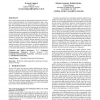Free Online Productivity Tools
i2Speak
i2Symbol
i2OCR
iTex2Img
iWeb2Print
iWeb2Shot
i2Type
iPdf2Split
iPdf2Merge
i2Bopomofo
i2Arabic
i2Style
i2Image
i2PDF
iLatex2Rtf
Sci2ools
95
Voted
CORR
2006
Springer
2006
Springer
Clustering and Sharing Incentives in BitTorrent Systems
Peer-to-peer protocols play an increasingly instrumental role in Internet content distribution. It is therefore important to gain a complete understanding of how these protocols behave in practice and how their operating parameters affect overall system performance. This paper presents the first detailed experimental investigation of the peer selection strategy in the popular BitTorrent protocol. By observing more than 40 nodes in instrumented private torrents, we validate three protocol properties that, though believed to hold, have not been previously demonstrated experimentally: the clustering of similar-bandwidth peers, the effectiveness of BitTorrent's sharing incentives, and the peers' high uplink utilization. In addition, we observe that BitTorrent's modified choking algorithm in seed state provides uniform service to all peers, and that an underprovisioned initial seed leads to absence of peer clustering and less effective sharing incentives. Based on our result...
CORR 2006 | Education | Peer Selection Strategy | Popular Bittorrent Protocol | Underprovisioned Initial Seed |
Related Content
| Added | 11 Dec 2010 |
| Updated | 11 Dec 2010 |
| Type | Journal |
| Year | 2006 |
| Where | CORR |
| Authors | Arnaud Legout, Nikitas Liogkas, Eddie Kohler, Lixia Zhang |
Comments (0)

